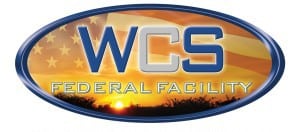
Waste Control Specialists on Thursday submitted its license application to the Nuclear Regulatory Commission to build and operate a consolidated interim storage facility for spent nuclear fuel in West Texas.
The facility, which would carry a 40-year license and have capacity to store 40,000 metric tons of waste, would be the first of its kind in the United States. A team led by competitor Holtec International plans to submit its own license application for a facility in southeastern New Mexico with a 70,000-metric-ton capacity. An estimated 74,000 metric tons of commercial spent fuel has accumulated at American reactor sites as a result of the Department of Energy’s failure to take title to the waste as outlined in the Nuclear Waste Policy Act of 1982.
Waste Control Specialists plans to complete its facility by December 2020 and begin accepting waste by 2021. On Thursday, following a press conference in Washington, D.C., WCS President and CEO Rod Baltzer said he’s confident the company can meet that timeline, but it will depend on the DOE and NRC regulatory processes. The consensus among utilities around the country is that DOE will need to take title to the waste in order for shipments to begin.
Two Republican congressman have introduced legislation that would allow DOE to contract private companies like WCS and Holtec for interim storage of nuclear waste. The department has laid out a three-part, consent-based waste siting strategy that envisions operation of a pilot storage facility by 2021; one or more interim facilities by 2025; and at least one permanent geologic repository by 2048. Rep. Mike Conaway (R-Texas) and Rep. Mick Mulvaney (R-S.C.) introduced the legislation, with Conaway’s bill allowing DOE to tap into the $34 billion Nuclear Waste Fund, freeing up as much as $1 billion a year.
However, House Energy and Commerce Committee Chairman Fred Upton (R-Mich.) and House Appropriations Environment and the Economy Subcommittee Chairman John Shimkus (R-Ill.) have said they will not consider any legislation that does not address the national repository planned at Yucca Mountain in Nevada, which the Obama administration canceled in favor of consent-based siting. The House energy and water spending bill for fiscal 2017 denies DOE any funding on consent-based siting, instead opting for $170 million for Yucca Mountain licensing activities.
On the Senate side, Senate Appropriations Energy and Water Development Subcommittee Chairman Lamar Alexander (R-Tenn.) and panel Ranking Member Dianne Feinstein (D-Calif.) have included in the fiscal 2017 Senate E&W budget bill language that recommends $61 million for DOE’s integrated waste management program.
“WCS is excited because there are two bills in the House, and Senate Appropriations language (that facilitate interim storage),” Baltzer said during the press conference at the National Press Club. “I’ll also take this opportunity to say we totally agree that there needs to be a permanent repository. There is no shirking that duty. It’s important for us, the nation, for everybody who’s out there. But it’s also a long process, and there are some immediate benefits you can get with interim storage.”
Baltzer estimated that DOE will save hundreds of millions of dollars by contracting private companies to provide interim storage. According to Congressional Budget Office statistics from 2015, the federal government has paid more than $5.3 billion in damages to utilities resulting from breached waste contracts.
Michael McMahon, senior vice president and project director for WCS partner AREVA TN, further defended the interim-storage concept during the press conference, saying it adds flexibility to the U.S. nuclear waste management program. A system with both interim storage and a repository would eliminate the failings the U.S. has faced with a single-point solution in Yucca Mountain, he said.
Baltzer was asked if WCS has a Plan B if Congress cannot come to terms on the prospect of interim storage, to which he replied that the company has explored the option of contracting directly with generators.
“They basically said, ‘If it’s still going to be my liability at the end of the day, I’d rather not transfer (the waste). I’d rather be able to see it when I look out my window,’” Baltzer said. “We don’t think it has legs unless DOE is able to do this.”
Advocacy groups Sustainable Energy and Economic Development (SEED) Coalition and Public Citizen spoke out against the project Thursday, with a representative present at the WCS event. The joint press release cites accident and sabotage risks associated with the project and warns that interim storage will evolve into permanent storage.
“Why is our region being targeted to become the nation’s dumping ground for high-risk high-level radioactive waste,” Public Citizen Texas Director Tom Smith asked in a statement. “Putting this waste on our highways and railway invites disaster. Radioactive waste moving through highly populated cities across the country could be targeted for sabotage by terrorists.”
WCS spokesman Chuck McDonald noted during the press conference that the U.S. has never recorded a transportation incident involving radioactive exposure:“There’s a lot of people who want to talk about this, and that’s understandable, but the record is about as good as it can get.”
The Nuclear Regulatory Commission is now reviewing the application for completeness, the agency’s Office of Public Affairs said Thursday. The full review will involve safety, technical, and environmental evaluations, which are estimated to take three years. The review will also require site-specific analysis, which allows the public to request a hearing before the NRC’s Atomic Safety and Licensing Board (ASLB), a process that could significantly lengthen the process. If and when the ASLB issues a final license, the applicant can begin construction of the facility.
In a blog post Thursday, NRC Spent Fuel Management Division Director Mark Lombard said the agency expects Holtec’s application for its own interim storage facility on Nov. 30.